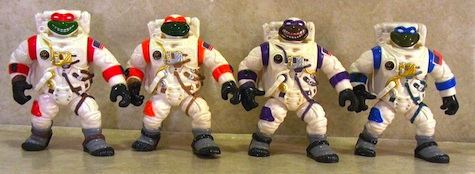The announcement, by the eminence grise of the (at least second) reboot of Teenage Mutant Ninja Turtles, Mr. Michael Bay, that in this iteration the turtles are going to be aliens has not, to put it mildly, been received terribly well by the internet at large. I’m not here to critique that reception; if the outrage has any problem at all, it’s one of scale, in that nothing should ever be called “Ninja Turtle-gate.” Make no mistake, though: this is, indeed, an unnecessary bit of fan trolling that cannot but ultimately hurt the reboot.
We should none of us be under any impression that the entertainment industry is anything but an industry. Beloved though a given movie, comic, TV show, or video game may be to its respective fandom, it is still, to the industry, a commodity. If additional profit can be made from a commodity, it’s good business to make that profit. But the thing to keep in mind, even looking at things from as coldly businesslike a perspective as one can, is that a pop cultural entity is what it is, and attains its status as a profitable commodity, through the emotional connection it establishes with its audience. To use the Teenage Mutant Ninja Turtles as an example, that connection, at a certain fundamental point, began with the reaction: “Teenage Mutant Ninja Turtles? That’s awesome.”
And, of course, there’s more to it than simply the (frankly, rather amazeballs) name. There are a number of fundamental elements that make the Teenage Mutant Ninja Turtles what they are to fans. (Here is where I must obligatorily state that I, as a “true fan,” have been a Turtles fan since my uncle gave me issue 5 of the original black & white comic for Christmas in 1987, predating the animated TV show and movie and so forth, therefore nya nya nya.) Among all the other elements to their origin story—living in a New York sewer with a rat who named them for Renaissance artists and taught them ninjitsu—the most important, in that it was the inciting event that led to their being, existentially, the very turtles they are today, is that the Turtles and Splinter became who they are through their accidental contact with a powerful mutagen. Their being mutants is, positionally, their second most important feature, after being teenagers. Granted, their being ninja turtles is what constitutes the bulk of the action in the comics, but were they merely that and no more, their staying power as a cultural institution (not to mention their frequent rises from the dead) would hardly be this tenacious. And teenage insouciance is all fine and good, but it’s window dressing. How did these turtles develop the anthropomorphic skills necessary to become teenage ninjas? Because they’re mutants. This may be the most important thing about their entire existence.
Their quadripartite identity is more than sufficient for the Teenage Mutant Ninja Turtles without having to make them aliens as well. Indeed, how gluttonous must one be for overly convoluted backstory that one requires entities already teenagers, already mutants, already ninjas, already turtles to be aliens as well? This is like reading Buddy Holly Is Alive And Well On Ganymede and demanding a rewrite making it so that Buddy has multiple personality disorder and is also Ritchie Valens and the Big Bopper existing in the same body. Nothing kills like overkill.

And, at a certain point, revision transforms a work into something fundamentally different. If Michael Bay’s iteration of the Turtles casts them as aliens instead of mutants, they become a wholly separate entity, and calling them Teenage Mutant Ninja Turtles becomes not only a complete misnomer, but one that is utterly insulting to its audience’s intelligence. A thing is not other than what it is, especially when it’s something as marvelously named as a Teenage Mutant Ninja Turtle, but this reliance on the power of the name as a brand, when one is engaged in the kind of baldfaced lie Bay and his collaborators seem to be telling, it becomes extremely bad business. If one is to sell Teenaged Mutant Ninja Turtles, they need to be that thing. Otherwise, to be blunt, it’s fraud.
Bay has urged everyone upset about this mangling of the Turtles’ origin story to relax, to wait and see what his writers have in mind. On the rational level, where I’m aware that it’s impossible to know what they have in mind without seeing at least a script, I’ll play along; there is, however infinitesimal, the possibility of some actual reason to make the Turtles aliens. But on the emotional fan level, it feels like an intellectually simplistic, cravenly avaricious man with expensive hair is personally ridiculing me for caring what words mean. For that, may he someday know the same degree of insult, though how one insults a man with such disregard for meaning of any sort is a bit beyond me.
Danny Bowes is a filmmaker and writer, whose work has appeared on nytheatre.com and premiere.com. He writes a weekly column each Wednesday at Hudak on Hollywood and reviews Asian cinema for Next Projection.










